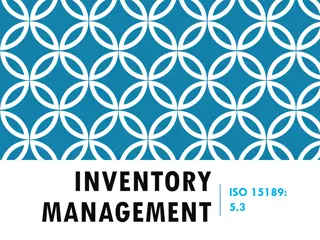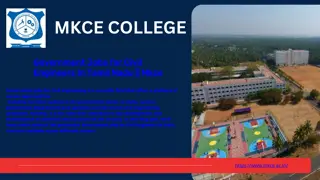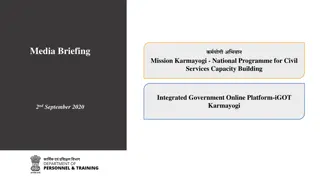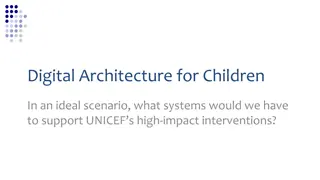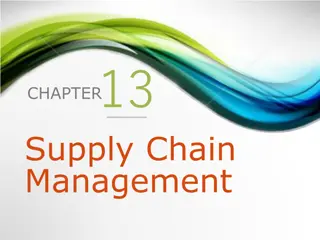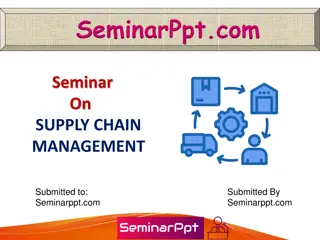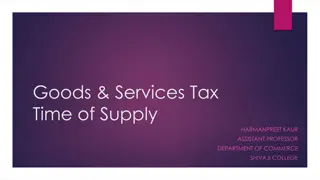Future-ready Civil Services Supply-side Interventions
Creating a state-of-civil services HR audit, data analytics, and knowledge partnerships. Focus on policy standardization, harmonization, and new initiatives. Implementing capacity-building through iGot training institutes, development plans, and shared learning resources. CBC's efforts with CTIs and deep dive into central training institutions. Supply-side interventions emphasizing minimum standards, accreditation, collaboration, and knowledge sharing for effective governance.
Download Presentation

Please find below an Image/Link to download the presentation.
The content on the website is provided AS IS for your information and personal use only. It may not be sold, licensed, or shared on other websites without obtaining consent from the author.If you encounter any issues during the download, it is possible that the publisher has removed the file from their server.
You are allowed to download the files provided on this website for personal or commercial use, subject to the condition that they are used lawfully. All files are the property of their respective owners.
The content on the website is provided AS IS for your information and personal use only. It may not be sold, licensed, or shared on other websites without obtaining consent from the author.
E N D
Presentation Transcript
Future ready civil services Supply side interventions
Creating future ready civil services State of Civil State of Civil State of Civil Services Services Services HR Audit HR Audit HR Audit HR Audit Data + Analytics Knowledge partners, content quality Policy, Standardization, Policy, Standardization, Policy, Standardization, Harmonization, New initiatives New initiatives New initiatives New initiatives Policy, Standardization, Harmonization, Harmonization, Harmonization, Demand supply Capacity Capacity Capacity Drive iGot iGot Training Institutes Development Plans Development Plans Development Plans Plus, Shared Learning Resources Annual HR Summit, Network, States+Global States+Global Annual HR Summit, Network,
CBCs efforts with CTIs so far 10+ 9 10 8 Hour long CTI Roundtable Field visits at CTIs Hour long workshop conducted on redesigning Common Mid Career Training Program Virtual interactions with CTIs
Deep-dive on Central Training Institutions 5/25 3/25 12/25 12/25 17/25 CTIs have a Learning Management System, Course System, Course Feedback Feedback Mechanism Mechanism in place Learning CTIs provide digital training sessions and workshops CTIs conduct Training Needs Analysis and Faculty Feedback CTIs conduct Management Development CTIs conduct Management Development Program Program 7/25 10/25 5/25 1/25 CTIs share content with other institutions CTIs have a Mentoring system in place CTIs have subscribed to E-libraries CTIs conduct Faculty Development Program
Supply side interventions: Key Ideas Introducing minimum standards & accreditation as means for continuous improvement Enhancing Collaboration & Cross Pollination Moving from Faculty led to Capacity Building approach Transformation to a Phygital world of capacity building Identification of Training Needs Enhancement and standardization in Training Course Design Promoting Knowledge sharing as communities of practice Overcoming challenges in Governance Embedding effective assessment of Trainings conducted
Improving the entire Network of CTIs and ATIs Mapping NAAA, Shimla, Himachal Pradesh LBSNAA, Mussoorie, Uttarakhand IGNFA, Dehradun, Uttarakhand 25 1. 2. 3. 4. 5. 6. 7. 8. New Delhi SS-IFS IIFT IIMC IEG IGAF ISTM NIDEM SPI 1. 2. 3. 4. Ghaziabad, Uttar Pradesh CBI-A NICF RAKNPA NPITRIT ISS, Greater Noida, Uttar Pradesh Central Training Institutions 1. 2. Faridabad, Haryana NACITN AJ-NIFM 33 Administrative Training Institutions 353 NAIR, Vadodara, Gujarat 1. 2. Nagpur, Maharashtra NADP NADT 1. 1. 2. 2. Lucknow, Uttar Pradesh SJR SJR- -RPFA RPFA IRITM IRITM Training Institutions mapped under M/Ds Training Institutions mapped under M/Ds NIDFM, Pune, Maharashtra 790 1. 2. Hyderabad, Telangana CISA SVP-PA Central Training Institute (CTI) Entire ecosystem of training institutions State Administrative Training Institute (ATI)
Draft Accreditation Framework for CTIs Our approach for developing the framework Our approach for developing the framework Journey so far Key aspects of the Framework Key aspects of the Framework Iterative process in developing parameters Benchmarking of accreditation frameworks Study of leading practices in teaching & learning Stakeholder Consultations Implementable across all Central Training Institutions As we move forward Integrate your field expertise with functional aspects of learning Learn from your experience Gain deeper understanding of the ecosystem Aspirational in nature enabling continuous improvement
Features of the framework - Elevating civil service capacity building Processes and their outcome / impact are evaluated Having a universal applicability Process-maturity based scale Objective and measurable Promote continuous improvement
Elements of the framework Operations and Governance Extent of financial & operational autonomy, grievance redressal, maintenance of data Resource Adequacy and Training Targets Faculty to trainee ratio, training man days, internal stakeholders Trainee Support Mentoring mechanisms, interaction & pre and post training support Training Needs Assessment & Course Design Processes in place to identify training needs & linking to course design Faculty Development Faculty development programs, faculty recruitment Collaboration Networking, knowledge & resource sharing Training Evaluation and Quality Assurance Procedures in place for course updation, feedback & trainee evaluation Digitization & Training Delivery Learning channels, Usage of LMS, channels of interactions
Way forward Collected common and relevant themes from CTI roundtable Circulate a collective concept note amongst all based on the discussions Aim to visit all CTIs and learn from their experience
The frameworks studied laid emphasis on Policies and procedures for ascertaining training needs of participants Clearly defined learning path & learning objectives for each course Availability of procedures on course revision and frequency of reviews of course content & quality Procedures on curriculum planning & implementation Identification of Identification of Training Needs Training Needs Application of multiple instructional methods by all faculty Inclusion of co-curricular & extra-curricular activities in overall training program Utilizing digital modes of learning delivery to supplement instructor-led modes Instructional design Instructional design and Training Delivery and Training Delivery Maintaining overall staffing levels - norms on faculty participant numbers in classroom sessions Promoting healthy balance between share of full-time and adjunct faculty Promotion of sharing of resources across departments and training institutions Training Resources Training Resources
The frameworks studied laid emphasis on Continuous monitoring of trainee progress & informing them of the same Methods of obtaining participant feedback on training programs and frequency of usage Availability of mechanisms for assessment of learning aligned with learning objectives Qualitative & quantitative measures to judge effectiveness of training programs Encouraging evaluation of long-term impact of trainings Training Training Evaluation and Evaluation and effectiveness effectiveness Availability of clearly defined procedures for promoting research Promotion of Research Facilities in training institutions Mobilizing resources for research including grants, research manpower, projects Implementing innovation ecosystem through incubators and initiatives for knowledge transfer Establishment of faculty exchange with Indian / International institutes Research Research Formal & informal mechanisms to address student grievances Availability and implementation of trainee orientation and assistance of students beyond the classroom Providing mentoring and coaching support and assessment of impact Promoting overall trainee / participant well-being Trainee Support Trainee Support & welfare & welfare
The frameworks studied laid emphasis on Availability of defined qualification standards for faculty Implementation of standard procedures followed in recruitment & selection of faculty Encouraging faculty onboarding and developmental programs on a periodic basis Facilitating knowledge transfer among faculty within and beyond training institutions Availability of structured mechanisms for skill development of faculty Faculty Faculty Availability of adequate IT and other physical infrastructure for all-round teaching & learning Promoting autonomy and transparency through clearly defined organization structure & responsibilities Considerable academic, administrative and managerial autonomy Maintaining legal & ethical requirements, integrity and transparency in administrative processes Infrastructure, Infrastructure, Operations and Operations and Governance Governance
Frameworks for Functional Evaluation Accrediting Council for Continuing Education Accrediting Council for Continuing Education & Training & Training South Asian Quality Assurance System South Asian Quality Assurance System International system of strategic audit and accreditation designed for the assessment of business schools in widely different national contexts. Evaluate the quality of education & training in a diverse array of non-traditional post-secondary educational providers Target Group: Career/vocation colleges, corporate training departments, trade associations and professional development programs. Target Group: All general management and business administration institutes that are member of AMDISA (Association of Management Development Institutions in South Asia) Skill India Skill India EFMD Quality Improvement System EFMD Quality Improvement System Accreditation, Affiliation, and Continuous Monitoring of the Training Centres to meet the pre-set quality standards by Sector Skill Councils (SSCs) in India. International system of accreditation designed for the assessment of business schools globally Target Group: Training Centres who wish to impart training according to National Skills Qualification Framework (NSQF). Target Group: All general management and business administration institutes.


![❤[PDF]⚡ Civil War Talks: Further Reminiscences of George S. Bernard and His Fel](/thumb/20551/pdf-civil-war-talks-further-reminiscences-of-george-s-bernard-and-his-fel.jpg)

